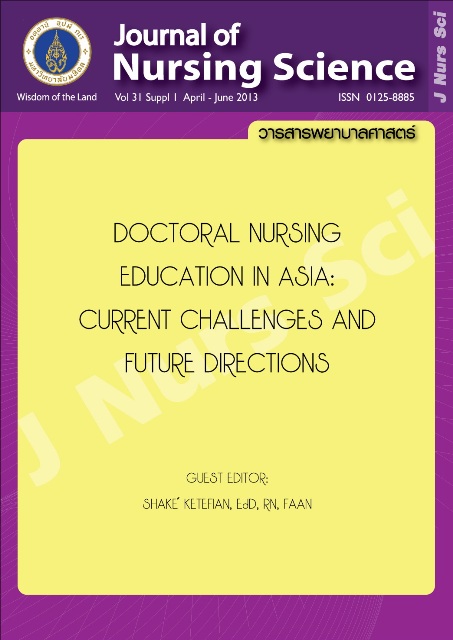Doctoral Nursing Education in South Korea
Main Article Content
Abstract
Introduction
History of nursing education in Korea goes back to 1903 when Pogunyogwan (the first woman’s hospital) Nurses’ Training School began to train nurses1. Modern Western medicine was introduced for the first time in Korea around this time. In 1953, following the Korean War, a Technical High School was opened to train nurses with aid from the United States. Two years later the first four-year college for nursing education was introduced in 1955. As of 2010, there are 102 four-year colleges admitting 6108 students and 71 three-year junior colleges admitting 8075 students per year. First master’s nursing program was introduced in 1960. As of 2010, there are 74 master’s programs admitting 970 students annually2.
The first nursing doctoral education was introduced in 1978 in Korea. This was the first such program in Asia. The number of nursing doctoral programs in Korea increased exponentially, numbering three in 1990 to 11 in 2000, and 32 in 2010. These 32 doctoral programs admit 222 doctoral students annually3. Korea had the fourth highest number of nursing doctoral programs in the world following the US, United Kingdom, and Japan4. This rapid increase in the number of doctoral programs in recent years has raised concerns about the quality of doctoral nursing education.
There have been a few studies on evaluating nursing doctoral programs in Korea. Park et al.5 analyzed 15 nursing doctoral programs in Korea using mail survey and phone survey in 2001. Kim et al.6 used a qualitative research design to explore the strengths and weaknesses of nursing doctoral education in Korea using four focus groups composed of deans, faculty, graduates and students of 14 universities in 2007. Kim et al.7 evaluated the quality of nursing doctoral education in terms of program, faculty, resources and having a plan in place for evaluation. They surveyed seven deans, 47 faculty, 52 graduates and 87 students from 14 nursing schools participated in their first study using online questionnaire starting in 2007. While there have been many changes in nursing education in Korea since these studies, a few findings are noteworthy from the latest reference7. Administratively, doctoral programs in private universities were perceived to have significantly higher quality than those in public and national universities. Institutions where the ratio of doctoral to non-doctoral students was greater, were shown to have higher quality. The program domain was deemed to be most important; some areas of the resource domain were identified as being problematic. Finally, the faculty’s perception of quality in the above three domains were more positive than those of students and graduates.
Article Details
Copyright Notice: Nursing Science Journal of Thailand has exclusive rights to publish and distribute the manuscript and all contents therein. Without the journal’s permission, the dissemination of the manuscript in another journal or online, and the reproduction of the manuscript for non-educational purpose are prohibited.

Disclaimer: The opinion expressed and figures provided in this journal, NSJT, are the sole responsibility of the authors. The editorial board bears no responsibility in this regard.


